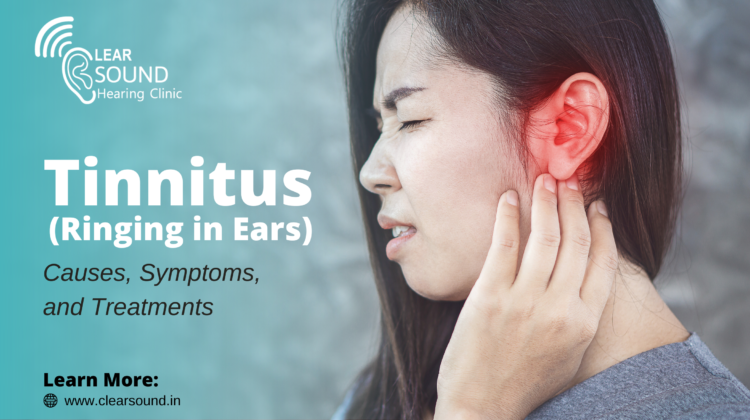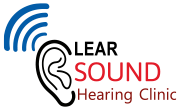
Tinnitus (Ringing in Ears): Causes, Symptoms, and Treatments
Do you hear a constant noise in your ears like buzzing, hissing, or ringing?… These are the common symptoms of tinnitus. For some individuals, it’s a mild annoyance… while for others it can be distressing & significantly impact daily activities.
Tinnitus might lead to difficulty in concentrating & sleeping, causing anxiety & even depression in severe cases. It can interfere with work, social interactions & personal relationships, ultimately affecting overall life.
Ringing in one ear only is “unilateral tinnitus” and if you are experiencing ringing in both ears then it is “bilateral tinnitus.”
People affected by tinnitus globally…
10-15% of adults worldwide experience tinnitus.
People affected by tinnitus in India…
6.7% of the Indian adult population experiences tinnitus.
Age…
Chronic tinnitus is prevalent more in the elderly than in the younger age groups, although it can occur at any age.
Gender…
Women are slightly more likely to experience tinnitus than men.
Impact on Mental Health…
45% of tinnitus patients in India experience anxiety & depression.
Ear ringing causes…
Tinnitus has various causes & understanding them is crucial to managing this condition.
One primary cause is exposure to loud noises for longer periods which harms the delicate structures inside the ear. As a result…the brain produces sounds which ultimately cause tinnitus. Ear infections can also trigger tinnitus which affects the nerves responsible for hearing.
Moreover…a buildup of earwax can lead to symptoms of tinnitus. Certain health issues like Meniere’s disease (basically an imbalance of fluids in the inner ear) often result in ringing in the ears.
Additionally…injuries to the head or neck that damage the pathways related to hearing might cause ongoing tinnitus. Psychological factors like stress, anxiety, or depression can be another factor.
For people experiencing tinnitus due to hearing loss, treatment with hearing aids not only improves hearing but also helps manage tinnitus by reducing its impact and making the unusual noises less noticeable.
In-depth exploration into these causes helps individuals determine why they might be experiencing tinnitus.
Diagnostic procedures & tests for tinnitus…
Below are all the diagnostic procedures & tests that evaluate tinnitus, understand its impact on the individual & help in making tailor treatment plans accordingly.
- Patient History & Physical Examination… The audiologist starts by gathering a detailed medical history and conducting a thorough physical examination. They inquire about the nature, duration & intensity of tinnitus symptoms along with any associated hearing problems or underlying health conditions.
- Hearing Tests… Audiological assessments such as pure-tone audiometry and speech audiometry help evaluate hearing abilities. These tests measure the sensitivity of hearing by determining the quietest sounds a person can hear at various frequencies.
- Tinnitus Pitch & Loudness Matching… Patients are asked to match the pitch and loudness of their tinnitus sounds using specialized equipment. This helps determine the perceived pitch & volume of the tinnitus, providing valuable information for treatment planning.
- Imaging Studies… In some cases, imaging tests like MRI/CT scans are performed to identify structural issues within the head & neck…such as tumors, abnormal blood vessels, or nerve pathway abnormalities that might be associated with tinnitus.
- Blood Tests… Blood tests may be conducted to check for specific underlying conditions that could contribute to tinnitus such as thyroid problems or anemia.
- Otoacoustic Emissions (OAEs)… OAEs measure sound waves produced by the inner ear’s outer hair cells in response to external stimuli. Absent or abnormal OAE might indicate damage to these cells which could be linked to tinnitus.
- Electrocochleography (ECochG)… ECochG measures the electrical potentials generated in the inner ear in response to sound stimulation. It aids in diagnosing specific inner ear disorders that might contribute to tinnitus.
- Tinnitus Functional Index (TFI)/Questionnaires… Healthcare professionals may use questionnaires like the Tinnitus Functional Index to assess the impact of tinnitus on various aspects of a person’s life including sleep, concentration & emotional well-being. These tools help in understanding the subjective experiences of patients.
- Loudness Discomfort Levels… LDL testing helps determine the level of sound at which a person perceives discomfort or pain. It helps in setting appropriate sound therapy levels for managing tinnitus.
- Psychological Evaluation… A psychological assessment might be recommended to evaluate the emotional impact of tinnitus. This evaluation helps in understanding the associated distress, anxiety, or depression and guides in developing coping strategies.
Cure for tinnitus…
These Treatments are a trial-and-error approach as they work for some people but not for all.
1. One often-suggested strategy is sound therapy. It uses external noise to alter your reaction to tinnitus. Research suggests sound therapy can help reduce or lessen tinnitus for some people.
Two Common types of sound therapy are masking & habituation.
- Masking… This exposes a person to background noise like white noise & nature sounds to mask tinnitus noise or distract attention away from it. Listening to sound machines or music through headphones or other devices can offer temporary breaks from noticing tinnitus. Household items like electric fans, radios, and TVs also can help.As many people with tinnitus also have some degree of hearing loss, hearing aids can be used to mask tinnitus by turning up the volume on outside noises.Note: This works especially well when hearing loss & tinnitus occur within the same frequency range.
- Habituation… Also known as tinnitus retraining therapy, this process trains your brain to become more habitual to tinnitus. Here you listen to noise similar to your tinnitus sound for long periods. Eventually…your brain ignores the tone along with the tinnitus sound. It’s similar to how you eventually don’t think about how glasses feel on your nose.The therapy is done with guidance from a specialist and the time frame varies per person, typically anywhere from 12 – 24 months.
2. Cognitive Behavioral Therapy (CBT) is another effective measure for managing tinnitus. By addressing negative thoughts and emotional reactions related to tinnitus, CBT helps in developing coping strategies, potentially reducing the distress associated with the condition.
3. Medications like anti-anxiety drugs may be recommended to minimize tinnitus-related stress/depression but their effectiveness differs for each person based on individual responses & tolerances to these drugs.
4. Stress reduction techniques including meditation, yoga, or deep breathing exercises offer strategies to reduce the influence of tinnitus on daily life by promoting relaxation & mental well-being.
5. Identifying triggers like loud noises or excessive caffeine consumption can play a crucial role in managing tinnitus symptoms. Avoiding these triggers may help in symptom management and decrease their severity over time.
6. Diet and lifestyle adjustments like reducing sodium intake or avoiding certain foods that might increase tinnitus, can contribute to managing symptoms. Maintaining a balanced diet & a healthy lifestyle positively impact tinnitus experiences.
7. Engaging in regular physical activities can also help in managing tinnitus by improving overall well-being. Exercise helps reduce stress and promotes better sleep which can indirectly help manage tinnitus in daily life.
Effective Tinnitus management…
Clear Sound Hearing & Speech Clinic helps manage your tinnitus through comprehensive diagnostic evaluation. Our audiologist carefully assesses your medical history & conducts hearing tests to determine the degree of your tinnitus. By understanding the specifics of your condition, we tailor personalized treatment because our ultimate goal is to provide effective solutions that reduce the impact of tinnitus on your daily life…
Also Read : 5 Tinnitus Relief Exercises to Calm and Control Tinnitus








